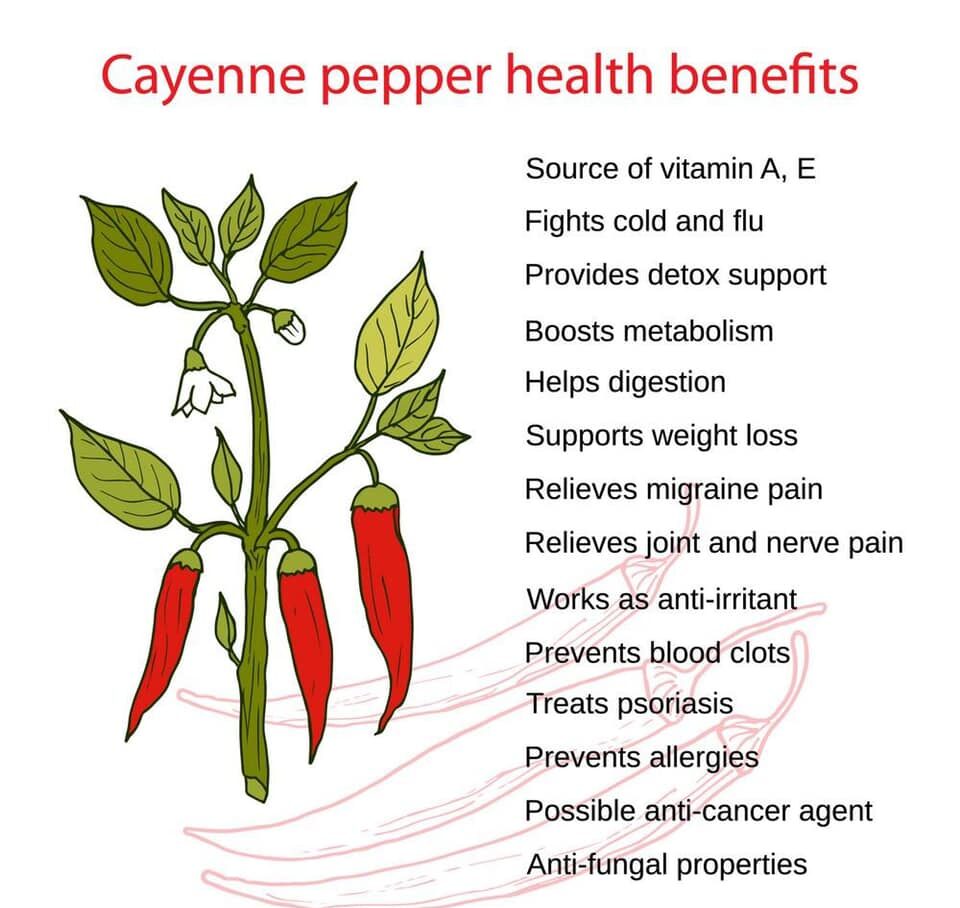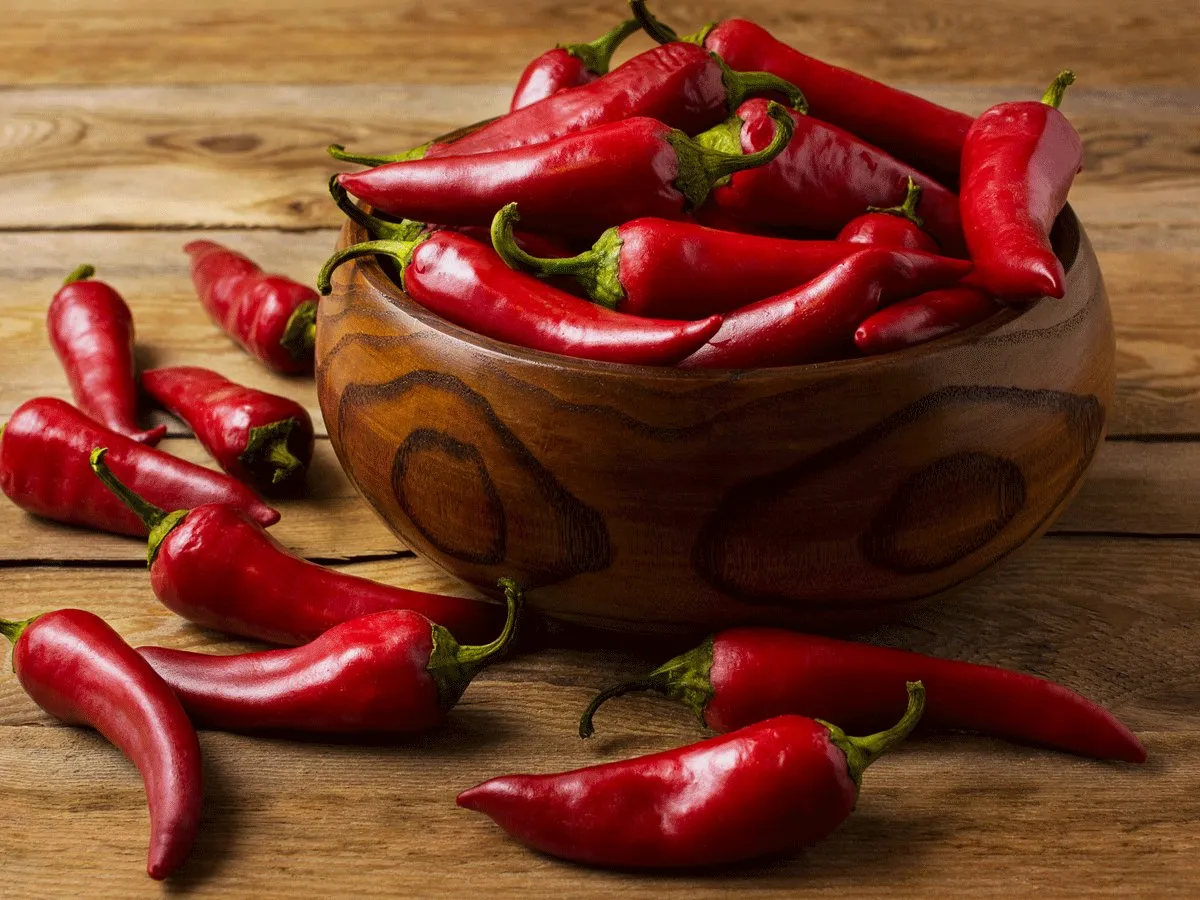
Chili peppers: Are you looking for a natural way to boost your immune system? Look no further than your kitchen spice rack! Chili pepper, a fiery ingredient known for adding a kick to your favorite dishes, may also have benefits for your immune health. Packed with a compound called capsaicin, chili pepper has been shown to have anti-inflammatory and antioxidant properties, which can support a strong immune response. In addition, capsaicin has been found to improve circulation and stimulate the production of endorphins, known as the body’s natural painkillers. So not only can chili pepper spice up your meals, but it might also spice up your immune system!
However, it’s important to note that while chili pepper may have potential immune-boosting benefits, it is not a miracle cure. A balanced diet, regular exercise, and good sleep are still key factors in maintaining a healthy immune system. So, next time you’re cooking up a storm in the kitchen, don’t be shy about adding a little extra spice with chili pepper – your immune system may thank you for it!

Contents
- 1 Understanding the immune system and its importance
- 2 The role of chili pepper in boosting the immune system
- 3 Nutrients in chili peppers that support immune health
- 4 Scientific studies on the immune-boosting effects of chili pepper
- 5 Other health benefits of chili peppers
- 6 Incorporating chili peppers into your diet for immune support
- 7 Precautions and potential side effects of consuming chili peppers
- 8 Recipes and creative ways to use chili peppers for immune health
- 9 The potential of chili peppers in supporting a healthy immune system
- 10 Author
Understanding the immune system and its importance
The immune system is a complex network of cells, tissues, and organs that work together to protect the body from harmful pathogens such as bacteria, viruses, and parasites. It plays a crucial role in maintaining overall health and well-being. When the immune system is functioning optimally, it can effectively identify and eliminate foreign invaders, preventing illness and infection.
The immune system consists of two main components: the innate immune system and the adaptive immune system. The innate immune system provides immediate, nonspecific defense against pathogens, while the adaptive immune system is responsible for a targeted response that recognizes and remembers specific pathogens for future encounters.
Maintaining a healthy immune system is essential for preventing and fighting off infections and diseases. Factors such as diet, lifestyle, and environmental factors can influence the immune system’s ability to function properly. Incorporating immune-boosting foods and ingredients into your diet, such as chili pepper, can provide additional support for a strong immune response.
The role of chili pepper in boosting the immune system
Chili peppers are not only known for their fiery taste but also for their potential health benefits. One of the key compounds found in protogel chili peppers is capsaicin. Capsaicin is responsible for the spicy sensation and has been found to have various health-promoting properties.
Studies have suggested that capsaicin can help stimulate the immune system by increasing the production and activity of immune cells. It has been shown to enhance the function of natural killer (NK) cells, which are responsible for recognizing and eliminating virus-infected cells and cancer cells. By boosting the activity of NK cells, capsaicin may help improve the body’s defense against infections and diseases.
In addition to its immune-boosting effects, capsaicin also has anti-inflammatory and antioxidant properties. Chronic inflammation can weaken the immune system and make the body more susceptible to infections. By reducing inflammation, capsaicin may help support a healthy immune response and protect against inflammatory conditions.
Furthermore, the antioxidant properties of capsaicin can help neutralize harmful free radicals in the body. Free radicals are unstable molecules that can damage cells and DNA, leading to various health issues. By scavenging free radicals, capsaicin may help reduce oxidative stress and promote overall immune health.
Nutrients in chili peppers that support immune health
Chili peppers are not only rich in capsaicin but also packed with essential nutrients that can support immune health. Here are some of the key nutrients found in chili pepper:
- Vitamin C: chili pepper are an excellent source of vitamin C, a powerful antioxidant that plays a vital role in immune function. Vitamin C helps stimulate the production of white blood cells, which are important for fighting off infections. It also helps protect immune cells from damage and supports the production of antibodies.
- Vitamin A: Chili peppers are also a good source of vitamin A, which is essential for maintaining the integrity of the skin and mucous membranes, the body’s first line of defense against pathogens. Vitamin A also plays a role in regulating immune cell function and promoting immune response.
- Beta-carotene: Chili peppers contain beta-carotene, a precursor to vitamin A. Beta-carotene acts as an antioxidant and helps boost immune function by enhancing the activity of immune cells.
- Minerals: Chili peppers are rich in minerals such as potassium and manganese, which are important for immune health. These minerals play a role in maintaining the balance of fluids in the body and supporting the function of immune cells.
By incorporating chili peppers into your diet, you can benefit from these immune-supporting nutrients and enhance your body’s natural defense mechanisms.

Scientific studies on the immune-boosting effects of chili pepper
Numerous scientific studies have explored the potential immune-boosting effects of chili peppers and capsaicin. While more research is needed to fully understand the mechanisms behind these effects, the findings so far are promising.
A study published in the journal “Frontiers in Immunology” found that capsaicin can stimulate the production of cytokines, which are small proteins that play a crucial role in immune signaling. The researchers observed that capsaicin increased the production of cytokines involved in immune response, suggesting that it may help enhance the body’s defense against infections.
Another study published in the journal “PLOS One” investigated the effects of capsaicin on the activity of immune cells. The researchers found that capsaicin increased the activity of NK cells and enhanced their ability to kill cancer cells. This suggests that capsaicin may have potential as an adjuvant therapy for cancer treatment.
Furthermore, a study published in the “Journal of Medicinal Food” examined the antioxidant and anti-inflammatory effects of capsaicin. The researchers found that capsaicin reduced inflammation and oxidative stress in cells, suggesting its potential in preventing and treating chronic inflammatory conditions.
While these studies provide valuable insights into the immune-boosting effects of chili pepper, it’s important to note that more research is needed to validate these findings and understand the optimal dosage and duration of chili pepper consumption for immune support.
Other health benefits of chili peppers
In addition to their potential immune-boosting effects, chili pepper have a range of other health benefits. Here are a few:
- Pain relief: Capsaicin is known for its analgesic properties and is often used topically to alleviate pain. It works by blocking pain signals and reducing the production of substance P, a neurotransmitter involved in pain perception.
- Weight management: chili pepper contain a compound called dihydrocapsiate, which has been found to increase fat oxidation and energy expenditure. Incorporating chili peppers into your diet may help boost metabolism and support weight loss.
- Heart health: Capsaicin has been shown to improve circulation and reduce blood pressure. It can also help lower cholesterol levels and reduce the risk of heart disease.
- Digestive health: Chili peppers have been traditionally used to improve digestion and relieve gastrointestinal issues. They can help stimulate the production of digestive enzymes and promote healthy gut function.
While chili peppers can offer these health benefits, it’s important to consume them in moderation and consider your individual tolerance for spicy foods.
Incorporating chili peppers into your diet for immune support
If you’re looking to incorporate chili peppers into your diet for immune support, there are several creative ways to do so. Here are some ideas:
- Add spice to your meals: Sprinkle chili flakes or finely chopped chili peppers on your favorite dishes, such as soups, stir-fries, or roasted vegetables. This will not only add flavor but also provide the immune-boosting benefits of capsaicin.
- Make spicy sauces and dips: Blend chili peppers with other ingredients like garlic, lime juice, and olive oil to create flavorful sauces and dips. Use them as a condiment for sandwiches, salads, or grilled meats.
- Infuse oils and vinegars: Infuse chili peppers into oils or vinegars to add a spicy kick to dressings, marinades, or homemade pickles. Simply place sliced chili peppers in a jar with the oil or vinegar and let it sit for a few weeks to develop the flavor.
- Try fermented chili products: Fermented chili products like kimchi or hot sauce can provide the benefits of chili peppers along with the probiotic benefits of fermentation. These products can help support a healthy gut and immune system.
Remember to start with small amounts of chili peppers if you’re not accustomed to spicy foods and gradually increase the quantity as you build tolerance. It’s also a good idea to consult with a healthcare professional if you have any underlying health conditions or concerns.
Precautions and potential side effects of consuming chili peppers
While chili peppers can offer numerous health benefits, they may not be suitable for everyone. It’s important to be aware of the potential side effects and precautions associated with consuming chili peppers.
- Digestive issues: Spicy foods like chili peppers can cause digestive issues such as heartburn, indigestion, or stomach discomfort in some individuals. If you have a sensitive stomach or a history of gastrointestinal issues, it’s best to consume chili peppers in moderation or avoid them altogether.
- Allergic reactions: Some people may be allergic to chili peppers or develop an allergic reaction upon contact. If you experience symptoms such as hives, swelling, or difficulty breathing after consuming chili peppers, seek medical attention immediately.
- Skin irritation: Capsaicin can cause skin irritation and burning sensation if it comes into contact with the skin. It’s important to handle chili peppers with caution and avoid touching your face or eyes after handling them.
- Interactions with medications: Chili peppers may interact with certain medications, particularly blood thinners or medications for high blood pressure. If you’re taking any medications, it’s advisable to consult with your healthcare provider before incorporating chili peppers into your diet.
It’s important to listen to your body and make informed decisions about consuming chili pepper based on your individual tolerance and health condition.

Recipes and creative ways to use chili peppers for immune health
Looking for some delicious recipes to incorporate chili pepper into your diet? Here are a few ideas to get you started:
- Spicy Roasted Cauliflower: Toss cauliflower florets with olive oil, chili powder, garlic powder, and a pinch of salt. Roast in the oven until golden brown and sprinkle with chopped fresh chili peppers before serving.
- Immune-Boosting Chili: Make a hearty chili by combining ground turkey or beef, diced tomatoes, kidney beans, onions, garlic, chili powder, cumin, and a touch of cayenne pepper for an extra kick of heat.
- Spicy Avocado Toast: Mash ripe avocados with lime juice, salt, and a sprinkle of chili flakes. Spread the avocado mixture on whole-grain toast and top with sliced chili peppers for a spicy twist on this classic breakfast staple.
- Hot Pepper Jelly: Combine finely chopped chili peppers, sugar, apple cider vinegar, and pectin in a saucepan. Cook until thickened and pour into sterilized jars. This tangy and spicy jelly can be enjoyed with crackers, cheese, or as a glaze for meat.
Get creative in the kitchen and experiment with different recipes to find your favorite ways to incorporate chili peppers into your meals.
The potential of chili peppers in supporting a healthy immune system
In conclusion, chili peppers can be a flavorful addition to your meals while potentially providing immune-boosting benefits. The compound capsaicin found in chili peppers has been shown to have anti-inflammatory, antioxidant, and immune-stimulating properties. However, it’s important to remember that chili pepper are not a miracle cure and should be consumed as part of a balanced diet and healthy lifestyle.
Incorporating chili peppers into your diet can provide essential nutrients like vitamin C and vitamin A, which support immune health. Scientific studies have shown promising results regarding the immune-boosting effects of chili peppers, but more research is needed to fully understand the mechanisms and optimal dosage.
If you enjoy spicy foods and have no contraindications, consider adding chili pepper to your favorite dishes, experimenting with spicy sauces and dips, or trying fermented chili products. Remember to start with small amounts and gradually increase the quantity to suit your taste and tolerance. If you’ve enjoyed reading about the fiery benefits of chili peppers, you might also be intrigued by the high-tech world of espionage from above. Consider exploring our fascinating article on Spy Satellites.







